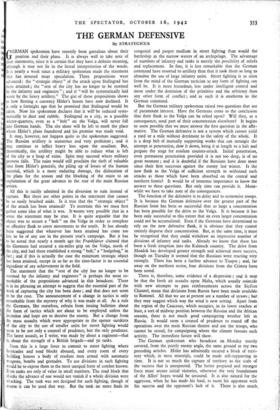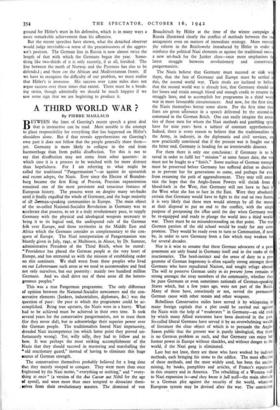THE GERMAN DEFENSIVE
By STRATEGICUS
GERMAN spokesmen have recently been garrulous about their position and their plans. It is always well to take note of their statements, since it is certain that they have a definite meaning, although it may not lie in the literal interpretation of the words. It is nearly a week since a military spokesman made the statement that has aroused most speculation. Three propositions were advanced: the "strategic object" of the attack upon Stalingrad has been attained ; the "rest of the city has no longer to be stormed by the infantry and engineers " ; and it "will be systematically laid waste by the heavy artillery." The gist of these propositions shows to how fleeting a currency Hitler's boasts have now declined. It is only a fortnight ago that he promised that Stalingrad would be aken. Now his spokesman declares that it will be reduced syste- matically to dust and rubble. Stalingrad as a city, as a possible winter-quarters, even as a "bolt" on the Volga, will never fall into German hands. The site alone will be left to mark the place where Hitler's plans foundered and his promise was made void.
It may, however, not happen quite as the spokesman suggested. The Russian artillery is numerous and very proficient ; and it may continue to inflict heavy loss upon the assailant. But, theoretically, the artillery might be able to reduce what is left of the city to a heap of ruins. Spite may succeed where military prowess fails. The ruins would still proclaim the theft of valuable time from Hitler's generals, the piling up of losses of the human material, which is a more enduring damage, the dislocation of the plans for the season and the blocking of the route to an exploitation of the great advance in the rear of the main Russian armies.
All this is tacitly admitted in the diversion to ruin instead of capture. But there are other points in the statement that cannot be so easily brushed aside. Is it true that the "strategic object" of the attack has been attained? To ascertain this we must first gather some idea of what it was. It ,seems very possible that in a sense the statement may be true. It is quite arguable that the object was to secure a " bolt " on the Volga in order to complete an effective flank to cover movements to the south. It has already been suggested that whatever has been attained has come too late to be of any use in the present year's campaign. But it has to be noted that nearly a month ago the Frankfurter claimed that the Germans had secured a six-miles grip on the Volga, north of the city, and had there established a strong "bolt," a "hedgehog," in fact ; and if this is actually the case the minimum strategic object has been attained, except in so far as the time-factor is an essential ingredient of any achievement in the field.
The statement that the "rest of the city has no longer to be stormed by the infantry and engineers" is perhaps the most re- markable of the propositions advanced in this broadcast. There is in its phrasing an attempt to suggest that the essential part of the work of capturing the city has been done ; and that does not seem to be the case. The announcement of a change in tactics is only remarkable from the mystery of why it was made at all. As a rule the Germans, like ourselves, refrain from issuing bulletins about the form of tactics which are about to be employed unless the intention and hope are to deceive the enemy. But a change from the mass assaults which were appropriate to the opener outskirts af the city to the use of smaller units for street fighting would seem to be not only a counsel of prudence, but the only prudence. The latest assault, as I write; was made by about a regiment—that is, about the strength of a British brigade—and 50 tanks.
Even this is a large force to commit to street fighting where barricades and road blocks abound, and every room of every building houses a body of resolute men armed with automatic weapons, bombs and grenades. To use divisions in such fighting would be to expose them to the most unequal form of combat known. Even tanks are only of value in small numbers. The road block that checks the advance of one would not vanish if a whole division were attacking. The tank was not designed for such fighting, though of course it can be used that way. But the tank no more finds its congenial and proper medium in street fighting than would the battleship in the narrow waters of an archipelago. The advantage of numbers of infantry and tanks is merely the possibility of reliefs and replacement. In fine, it is less remarkable that the German command have resorted to artillery than that it took them so long to abandon the use of large infantry units. Street fighting is as alien from the mind of the German tactician as any form of fighting can well be. It is more hazardous, less under intelligent control and more under the dominion of the primitive and the arbitrary than any other form of conflict ; and as such it is anathema to the German command.
But the German military spokesman raised two questions that are of paramount interest. Have the Germans come to the conclusion that their flank to the Volga can be relied upon? Will they, as a consequence, send part of their concentration elsewhere? It begins to seem possible that we must answer the first question in the affir- mative. The German defensive is not a system which cannot yield a yard or a mile without detriment to the safety of the whole. It is a deep belt of mutually supporting works that can entangle the attempt at penetration, slow it down, bring it at length to a halt and prepare the stage for resolute counter-attack. Initial penetration, even permanent penetration provided it is not too deep, is of no great moment ; and it is doubtful if the Russians have done more since their first successes against the enemy last winter. Is the new flank to the Volga of sufficient strength to withstand such attacks as those which have been absorbed on the central and northern fronts? It would be of immense importance to know the answer to these questions. But only time can provide it. Mean- while we have to take note of the consequences.
The function of the defensive is to delay and to economise troops. It is because the German defensive over the greater part of the Russian front has been so successful that so large a concentration has been possible for the drive to the Volga. It is because it has been only successful to this extent that an even larger concentration could not be accumulated. Even if the Germans have determined to rely on the new defensive flank, it is obvious that they cannot entirely disperse their concentration. But, at the same time, it must be recognised that they could withdraw an impressive number of divisions of infantry and tanks. Already we know that there has been a fresh irruption into the Kalmuck country. The drive from Moz,ciok has developed greater strength and achieved more success, though on Tuesday it seemed that the Russians were reacting very strongly. There has been a further advance to Tuapse ; and, far away on the northern sector, four divisions from the Crimea have been noted.
There is, therefore, some evidence of a dispersion ; and it may be that the fresh air assaults upon Malta, which usually coincide with new attempts to pass reinforcements across the Sicilian Channel, mean that divisions from Russia have been made available to Rommel. All that we see at present are a number of straws ; but they may suggest which way the wind is now setting. Apart from , the region of the Caucasus, which occupies, in its lower reaches at ' least, a sort of midway position between the Russian and the African seasons, there is not much good campaigning weather left in Russia. It would seem a counsel of prudence to round off the operations over the main Russian theatre and use the troops, who cannot be rested, for campaigning where the climate favours such activity. The immediate future will show.
The German spokesman who broadcast on Monday merely covered, from the purely enemy angle, the same ground as my two preceding articles. Hitler has admittedly secured a block of terri- tory which, in most materials, could be made self-supporting in time. It is not so much the capture of territory as the scale of the success that is unexpected. The better prepared and stronger force must secure initial victories, otherwise the very foundations of the Allies' hopes would be unsound. It is also natural for the aggressor, when he has made his haul, to taunt his opponent with his success and the opponent's lack of it. There is also much, ground for Hitler's trust in his defensive, which is in many ways a more remarkable achievement than his offensive.
But the recent speeches have shown, what the detached observer would judge inevitable—a sense of the precariousness of the aggres- sor's position. The German line in Russia is now almost twice the length of that with which the Germans began the year. Some- thing like two-thirds of it is only recently, if at all, fortified. The line between the north of Norway and the Pyrenees has also to be defended ; and there ore the African and Mediterranean fronts. If we have to recognise the difficulty of our problem, we must realise that Hitler's is immense. His success over i,000 miles does not argue success over three times that extent. There must be a break- ing strain, though admittedly we should be much happier if we saw some sign that we are beginning to produce it.



























 Previous page
Previous page